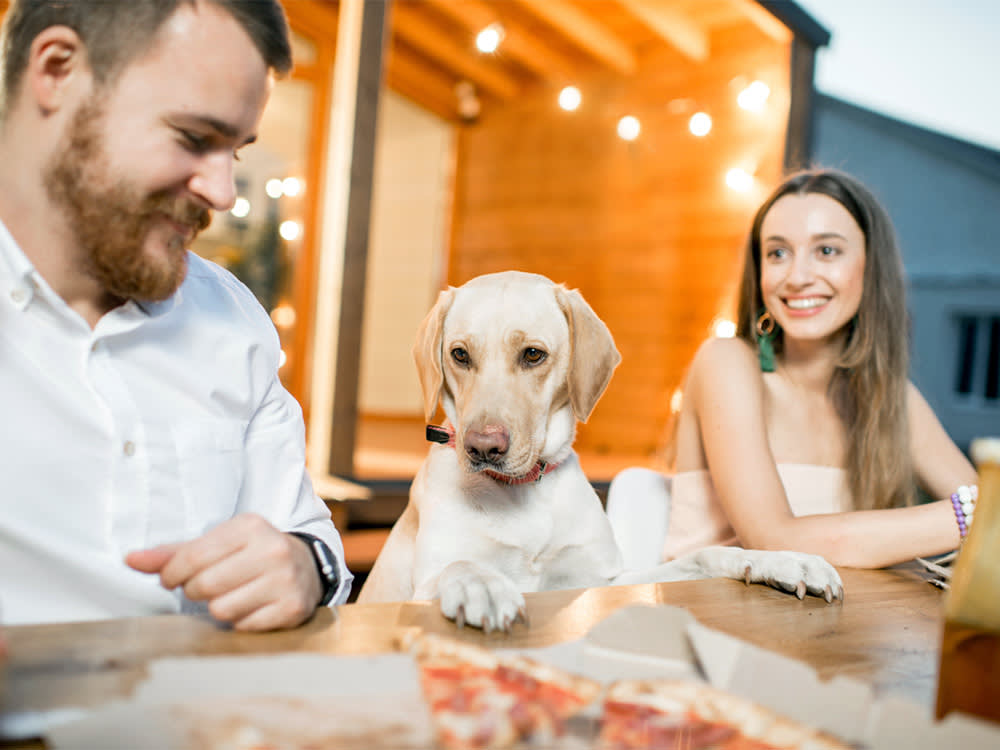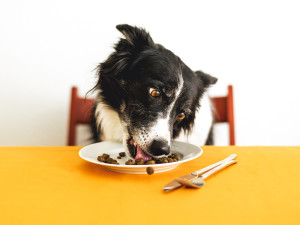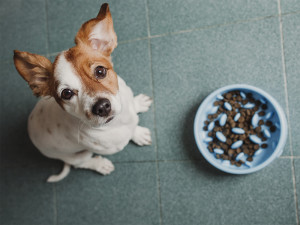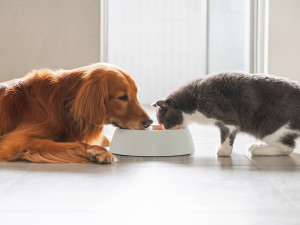Labs Are Actually Hungrier Than Other Dogs, New Study Finds
Being constantly starving is in their genes.

Share Article
To state the obvious: Dogs love food. Begging at the dinner table or passive-aggressively pawing at an empty kibble bowl is totally normal — if a little annoyingopens in a new tab — pup behavior. But if you have a Labrador who seems a little extra food-obsessed, it turns out there may be a scientific reason behind their fixation. A new studyopens in a new tab published in Science Advances found that one in four Labs have a genetic mutation that causes them to feel hungrier in between meals.
Labs are genetically hungrier
Previous research has found that dogs with a mutation of the pro-opiomelanocortin (POMC) gene have a higher risk of obesity, and scientists wanted to explore how the mutation impacts a dog’s eating behavior.

Trick question: All dogs are perfect! But find out which type is the best fit for you.
In one experiment, they showed dogs a sausage and then locked the sausage away in a perforated box. The dogs had eaten breakfast three hours earlier, so they shouldn’t have been overly hungry. They found that dogs who had the POMC mutation spent two times as much time trying to get to the sausage than the other dogs. “What we see in the dogs is that they’re getting this molecular starvation signal,” Eleanor Raffan, a co-author of the paper, told the Scientific Americanopens in a new tab.
The researchers then conducted another experiment to see if it would take dogs with the POMC mutation longer to feel full when eating. After an overnight fast, dogs were offered a can of food every twenty minutes. The dogs were allowed to eat the food until they either didn’t finish a can or vomited. The results were unexpected: Though both groups ate a massive amount of food (twice their total daily energy requirement), the dogs with the POMC mutation didn’t eat more food than the others.
The two experiments together show that while dogs with the POMC mutation are hungrier than other dogs, they don’t actually need more food to feel full. Interestingly, though, dogs with the POMC mutation were much less likely to vomit — only one dog in the POMC mutation group threw up their food, while over half the others did. This means that dogs with the POMC mutation may be able to tolerate larger meals.
They also burn calories slower
Researchers also measured how quickly dogs with the POMC mutation burn calories. They had 19 dogs fall asleep in a chamber and then measured the metabolic gasses they produced. With this information, they were able to calculate how much energy the dogs burned. They found that dogs with the POMC mutation burn calories much more slowly than dogs without the mutation.
The fact that Labs are hungrier, have more tolerant stomachs, and burn calories slowly means they’re at higher risk for obesityopens in a new tab. If you have a Lab (or any breed, really), keep an eye on their eating habits and be sure you’re giving them lots of exercise and the recommended amount of food. And if they happen to get a little chubby anyway, well, science says it might be destiny.

Sio Hornbuckle
Sio Hornbuckle is a writer living in New York City with their cat, Toni Collette.
Related articles
 opens in a new tab
opens in a new tabWhat’s Actually On (and In) a Bag of Pet Food?
Want your pet to eat healthily? Dig in and learn how to read their food label.
- opens in a new tab
What’s in a Cup?
A dog food measurement by any other name would be confusing.
 opens in a new tab
opens in a new tabShould You Put Your Dog on a Low-Calorie Diet?
Diet culture is a tricky thing — for pets, too.
 opens in a new tab
opens in a new tabHow You Can Easily Manage Your Dog’s Weight
Keep your pup’s weight down, and you could add years to their life. What’s better than that?
 opens in a new tab
opens in a new tabHow to Slow Down a Dog Who Eats Too Fast
Plus 6 stylish slow-feed dog bowls.
 opens in a new tab
opens in a new tabHow Many Calories To Feed Your Dog — And A Dog Calorie Counter
How many calories does a dog need?

